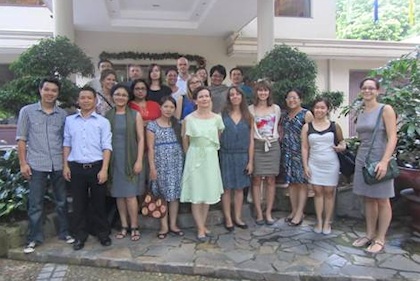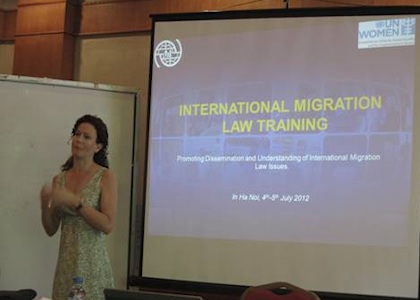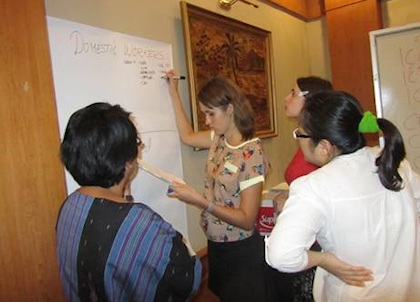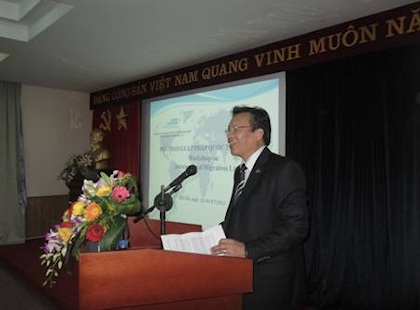UN Women and IOM conduct migration law workshop across UN family first time in Viet Nam
Date:
HA NOI, 5 July 2012 – UN Women with the International Organization for Migration (IOM) Viet Nam jointly organized two capacity building workshops on international migration law and international human rights instruments with key government counterparts and UN agencies to promote UN Women’s central role working collaboratively to ensure a more coherent UN system response to advance gender equality.
The protection of the rights of workers employed outside their countries of origin has been the subject of increasing concern throughout the UN system as approximately half of a million Vietnamese migrant workers are currently employed abroad, one third of which are women. A large array of international instruments exists to provide parameters for the regulation of international migration and standards for human and labour rights.
UN Women Viet Nam Country Office, with the International Organization for Migration (IOM) designed and conducted a training workshop on International Migration Law for 32 participants from UNDP, UNFPA, UNDSS, UNODC, UNIAP as well as UN Women staff from Nepal, Laos, Indonesia, Bangladesh and Viet Nam.
International Migration Laws is an umbrella term covering a variety of principles and rules that together regulate the international obligations of States with regard to migrants. Understanding International Migration Laws will enhance capacity of UN Women staff supporting States in developing migration policies and legislation that conform to IML in order to manage migration more effectively and in a manner consistent with international law.
This workshop for UN staff was followed by a similar workshop on International Migration Law for 38 of Viet Nam’s government officers working in the area of international migration. This workshop was organized by UN Women in collaboration with the Department of Overseas Labour, the Ministry of Labour Invalids and Social Affairs of Viet Nam.
Since 2006, international labour migration in Viet Nam has rapidly increased with 70,000 to 80,000 women and men workers overseas annually. There are currently 500,000 Vietnamese people working overseas in close to 40 countries and territories worldwide. The number of Vietnamese women migrating for work overseas has increased over the last decade. According to official data available on regular or documented migration, in recent years, women have comprised 25%–30% of the total outgoing labour force.
During the training, participants had opportunities to learn new knowledge related to the human rights of migrants, international labour law and the protection of non-nationals, irregular migrants and trafficking in persons and smuggling of migrants and discussed case studies on protection of migrant workers, especially women migrant workers. Two experienced international migration law experts from IOM were invited to lead the training, including Ms Kristina Touzenis, Head of International Migration Law Unit of the IOM in Geneva and migration law expert Ms Fanny Dufvenmark.
Mr. Dao Cong Hai, Deputy General Director of the Overseas Labour Department said that this first training on International Migration Law for the government staff will “support the (government)task of protecting Vietnamese migrant workers, especially women migrant workers.” The government agency looks to work with UN Women to expand the knowledge of international migration law in Viet Nam, with first priority given for government staff at sub-national level.
These two workshops are activities within the framework of the UN Women Regional Programme on Empowering Women Migrant Workers. Viet Nam has joined the third phase of this UN Women Regional Programme that covers works in Asia Pacific and the Arab States (Bangladesh, Cambodia, India, Indonesia, Jordan, LAO PDR, Nepal, Philippines, Thailand and Viet Nam). The capacity building initiative reflects and contributes to the overall programme goals by adopting a multi-stakeholder, gender-responsive and rights-based approach. The programme targets to empower women migrant workers by addressing their concerns and ensuring their rights are recognized and respected.
Strategically the regional programme works to catalyze enabling policy, enhance the capacity of government and other relevant agencies to ensure women migrants’ rights and entitlements are protected through improved, gender-sensitive recruitment practices, provision of comprehensive services to promote the economic and social welfare of women migrants, and greater awareness of women migrants.

UN Women – IOM joint training workshop on International Migration Law
Photo: UN Women

Ms. Kristina Touzenis – Head of International Migration Law Unit of IOM
Photo: UN Women

The participants working on human rights of women migrant workers
Photo: UN Women

Mr. Dao Cong Hai – Deputy General Director – Department of Overseas Labour, Ministry of Labour, Invalids and Social Affairs of Viet Nam opened the Training workshop on International Migration Law for Government’s staff.
Photo: UN Women